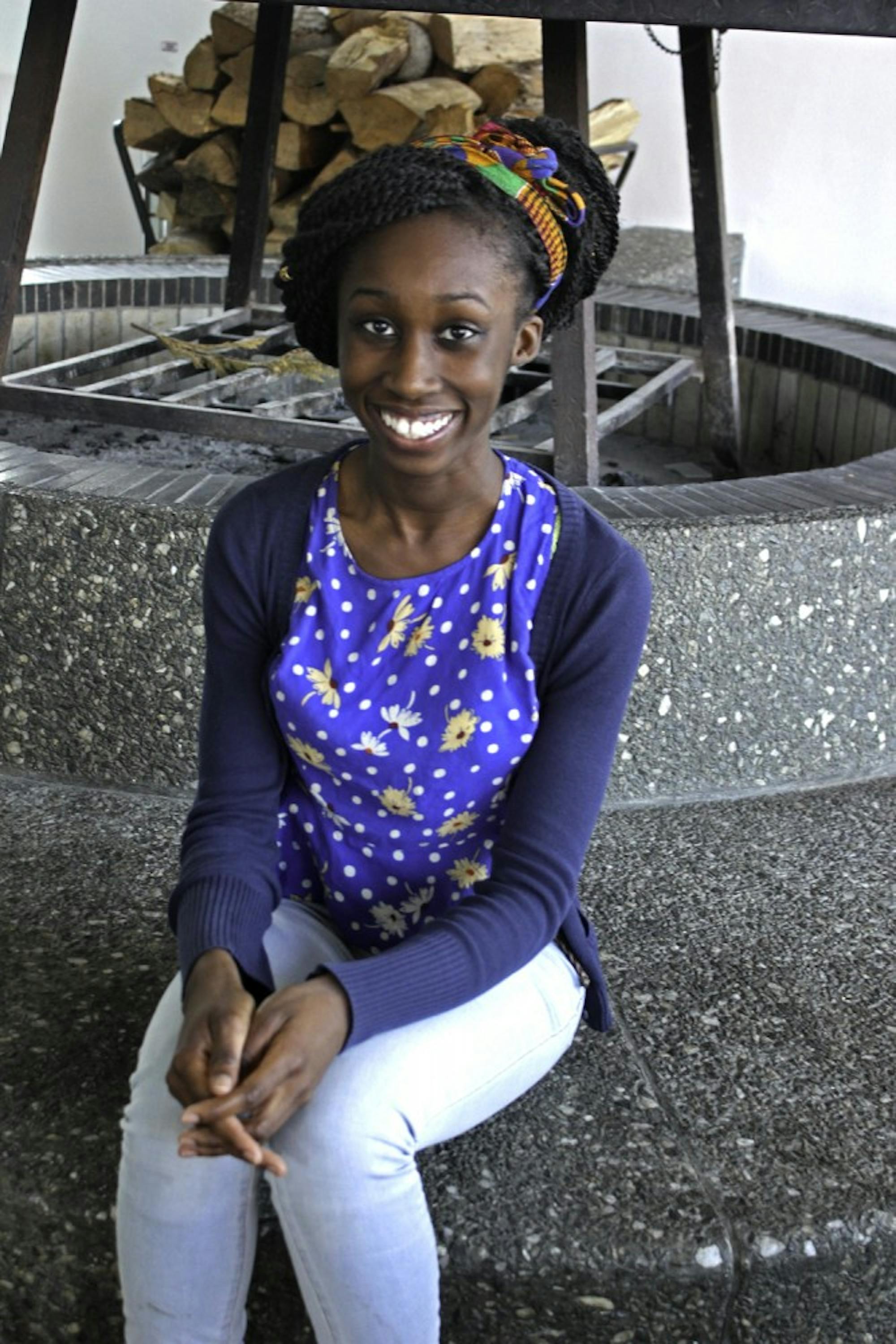In elementary school, a peer at school said to Nana Adjeiwaa-Manu ’16, “Your food looks nasty.” It was kontomire, a traditional Ghanaian stew.
“I didn’t know how to deal with that,” Adjeiwaa-Manu said.
The exchange has inspired her interest in questions about identity. Her mother’s response, she said, stuck with her: “You’re an African, first. You should be proud of your heritage and not look down upon it, even if other people look down upon it.”
Coming to college has made her attachment to her ethnic identity even stronger, she said.
“It was always a struggle to choose to abandon my Ghanaian side and completely identify with the United States, or reject the United States culture and be Ghanaian,” Adjeiwaa-Manu said. “Music helped me answer those questions about identity.”
Adjeiwaa-Manu started playing piano at age 5 and cello at 7. She continued her cello studies at the Baltimore School for the Arts, a pre-professional arts high school. A sociology major modified with African and African-American studies and a Spanish minor, she is involved with the arts through various chamber music groups, student performances and playing at her church.
She decided to join chamber music because she enjoys “being able to make decisions with group members” and wanted to meet other people in a more intimate setting, she said.
“I love the collaborative nature of it,” Adjeiwaa-Manu said. “I love the way different instruments sound together.”
Although a large portion of her repertoire includes classical music, she explored more modern music through playing for her church and outside gigs.
Adjeiwaa-Manu recently finished a series of three concerts that highlighted the duet “A Lifelong Journey.” The piece, composed by Lanphord Cao ’16 and inspired by the “ups and downs” of life, according to Cao, featured Adjeiwaa-Manu on cello and Cao on piano. Because the piano and the cello are both “strong instruments,” Cao said, there were instruments of both conflict and harmony in the piece.
“Adjeiwaa-Manu is very mature as a student artist, and very inspirational as a person,” Cao said. “She understands the subtleties an artist needs in order to interpret a piece.”
Music allowed Adjeiwaa-Manu to meet people she wouldn’t otherwise have met. She said her musical journey has been similar to her journey as a Ghanaian American.
Both of her parents immigrated to the U.S. Living in America taught her how to identify with people from different backgrounds and experiences, she said.
“Playing the cello and the piano taught me a lot about persistence, not only in music but other areas of my life as well,” Adjeiwaa-Manu said.
In both her academic pursuits and her personal life, music has shown her how to evaluate herself when she fails and to figure out how to strive to do better, she said.
Among the life lessons that music has taught her, Adjeiwaa-Manu said, is humility.
“I was surrounded by great, great artistic talent,” she said of her time at the Baltimore School for the Arts. “Just being around people who were better than me in the arts was really, really humbling.”
She has applied these lessons to her beliefs about her cultures, and said she “learned how to love [her] culture but have respect for other cultures as well.”
In the future, Adjeiwaa-Manu said she hopes to continue with the cello and piano. She is interested in philanthropic and community-based work involving teens from Latin America and Africa, and wants to answer questions about identity with immigrant children and teenagers. Plans for non-profit consulting or starting her own non-profit involved with arts education may also be in the future as well, she said.
“I’m really interested in understanding people like me, and I think it’s a question lots of children deal with,” she said.
Her independent study reflects the bridge between her heritage and interest in the arts.
Under the guidance of theater professor Laura Edmondson, Adjeiwaa-Manu is conducting original research on traditional Ghanaian funerals — which feature traditional clothing and dance — that take place in the U.S.
“These ceremonies are performance art in terms of dance and imagery,” Adjeiwaa-Manu said. “They are a way to form community in an unfamiliar place.”
Edmondson called Adjeiwaa-Manu a “quiet leader.”
“She doesn’t call attention to herself, yet emerges with clarity and depth of thinking,” she said.
Edmondson also spoke to Adjeiwaa-Manu’s emotional maturity and her steadiness, clarity and purpose, an observation echoed by Kristen Miller, Adjeiwaa-Manu’s first cello teacher.
During times when Adjeiwaa-Manu would struggle with a particular passage, Miller said that she would smile and say, “Oh, I can do better than that.”
“Attitude is everything,” Miller said. “I don’t think Nana ever expected herself to be perfect the first time. But she expected herself to work hard, and she knew good results would come from that.”
The Last Word:
Favorite Late Night Collis order? Six chicken tenders.
Favorite television shows? A tie between “Scandal” and “How to Get Away with Murder.”
Favorite study spot? My dorm room.




